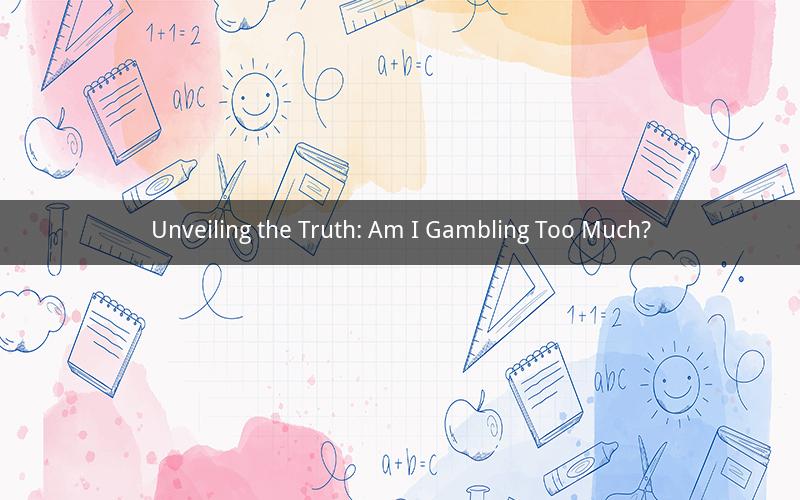
Introduction:
Gambling is a popular pastime for many people around the world. However, it is crucial to recognize when one's gambling habits may have crossed the line into excessive behavior. In this article, we will explore the signs of excessive gambling and provide guidance on how to determine if you are gambling too much.
Signs of Excessive Gambling:
1. Loss of Control: If you find yourself unable to stop gambling, even when you know it is causing financial or personal problems, it may be a sign of excessive gambling.
2. Financial Woes: Excessive gambling can lead to significant financial strain, including debt, loss of savings, and inability to pay bills.
3. Emotional and Psychological Effects: Excessive gambling can cause anxiety, depression, and relationship problems. It can also lead to increased stress and mood swings.
4. Time Spent Gambling: If you find that you are spending a disproportionate amount of time gambling, at the expense of other important activities such as work, family, and social interactions, it may be a sign of excessive gambling.
5. Lying or Hiding: If you find yourself lying or hiding your gambling habits from loved ones, it may indicate a problem.
How to Determine If You Are Gambling Too Much:
1. Reflect on Your Gambling Habits: Take a moment to reflect on your gambling habits. Ask yourself if you are able to control your spending and if you are gambling for enjoyment or to relieve stress.
2. Consider the Impact: Assess the impact of your gambling on your financial, emotional, and social well-being. If you are experiencing negative consequences, it may be a sign that you are gambling too much.
3. Seek Professional Help: If you are unsure about your gambling habits, it is advisable to consult with a mental health professional or a gambling counselor. They can provide guidance and support tailored to your specific needs.
4. Set Limits: Establish clear limits for your gambling activities, including time spent, amount of money wagered, and the types of games you play. Stick to these limits to maintain control over your gambling habits.
5. Create a Support System: Surround yourself with individuals who are supportive of your efforts to control your gambling. This may include friends, family, or a support group for problem gamblers.
FAQs:
Q1: What are the risks of excessive gambling?
A1: Excessive gambling can lead to financial strain, emotional and psychological issues, relationship problems, and legal difficulties.
Q2: Can excessive gambling be treated?
A2: Yes, excessive gambling can be treated. Treatment options include therapy, counseling, support groups, and in some cases, medication.
Q3: How can I prevent excessive gambling?
A3: To prevent excessive gambling, it is essential to set limits on your gambling activities, be aware of the risks, and seek support from friends, family, or professionals when needed.
Q4: Is there a difference between problem gambling and pathological gambling?
A4: Yes, problem gambling is characterized by harmful gambling behavior that leads to significant negative consequences. Pathological gambling, also known as gambling addiction, is a severe form of problem gambling where individuals experience intense cravings, preoccupation, and an inability to control their gambling behavior.
Q5: Can I still enjoy gambling if I am not gambling excessively?
A5: Absolutely! Gambling can be a fun and enjoyable activity when it is done in moderation and for the sake of entertainment. The key is to maintain control and be mindful of the potential risks associated with gambling.
Conclusion:
Determining whether you are gambling too much involves assessing the impact of your gambling habits on your life. If you recognize signs of excessive gambling, it is crucial to take steps to address the issue. Seeking support from professionals, setting limits, and maintaining a healthy balance between gambling and other aspects of your life are essential in managing excessive gambling. Remember, it is never too late to take control of your gambling habits and lead a healthier, more fulfilling life.